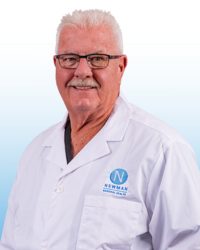Colorectal Cancer Screening
Colorectal cancer is the fourth most common cancer in the United States and the second leading cause of death from cancer. Approximately 4.1% of men and women will be diagnosed with colorectal cancer at some point in their lifetime. The American Cancer Society estimated that in 2022 there will be 151, 030 new cases of colorectal cancer with 52,580 deaths during 2022. The five-year survival rate of colorectal cancer is 65.1% and is dependent upon your stage at diagnosis. The 5-year relative survival for localized colorectal cancer is 90.9% but is 15.1% once it has metastasized. Research has shown that undergoing screening colonoscopies at regular intervals is associated with as much as a 69% decrease in new cases of colorectal cancer and an 88% decrease in the risk of death.

What is Colorectal Cancer?
Colorectal cancer begins in the colon or rectum. Colon cancer and rectal cancer are often grouped together because they share common features. A polyp on the inner lining of the colon or rectum is usually where colorectal cancer begins. There are two main types of polyps:
- Adenomatous polyps: These polyps sometimes change into cancer. They are called a precancerous condition.
- Hyperplastic polyps or inflammatory polyps: These polyps are more common but are not pre-cancerous.
- Cancer which forms in a polyp can eventually grow into the wall of the colon or rectum.
Colorectal Cancer Risk Factors
Lifestyle-related factors have been linked to colorectal cancer. The American Cancer Society says, “Some of the links between diet, weight, exercise and colorectal cancer risk are some of the strongest for any type of cancer.” Those lifestyle-related factors include being overweight, physical inactivity, a diet high in red meats and processed meat, smoking and heavy alcohol use.
Making changes to your lifestyle can decrease your risk of developing colorectal cancer. Eating a diet high in vegetables, fruits and whole grain fibers have been linked with a lower risk of colorectal cancer. Increasing physical activity levels and maintaining a healthy body weight can also reduce risk.
There are some risk factors which cannot be changed. The risk of colorectal cancer goes up as you age – becoming much more common after the age of 45. Other unchangeable risk factors include a history of polyps, cancer, type 2 diabetes or inflammatory bowel disease. African Americans have the highest colorectal cancer rates of all racial groups in the United States and Jews of Eastern European descent have one of the highest colorectal cancer risks of any ethnic group in the world.
Beginning at the age of 45, men and women with an average risk for developing colorectal cancer should have a colonoscopy. The age was decreased to 45 from 50 by the US Preventive Services Task Force for initial screening colonoscopy in 2021. This is because of rising rates of CRC in younger people. For certain patients, including those with a family history of early-onset CRC or diseases like inflammatory bowel disease, screening may be started even earlier than age 45.
Screening Saves Lives
Screening for colorectal cancer can save lives. The gold standard for screening for colorectal cancer is to undergo a colonoscopy. Colonoscopies are regularly performed at Newman Regional Health here in Emporia.
Colonoscopies at NRH are performed by our team of surgeons: Dr. Bradon Bitter, Dr. Tim Harris, and Dr. Matthew Turner.
The procedure lasts approximately 30 to 60 minutes. Medication is given to make you feel relaxed and drowsy while the doctor uses a colonoscope to examine the lining of the colon.



Talk to your provider
If you are 45 years old or have a high risk for developing colorectal cancer talk with your medical provider about screening options. At Newman Regional Health, we strive to provide high-quality health care for all of our patients. Let us take care of your healthcare needs! Request an appointment through our website or give us a call: (620) 343-6800 or (620) 343-2376 to meet with your provider to discuss colorectal cancer screening today. For a list of Newman Regional Health Medical Partners providers click here.
Additional resources for information:
